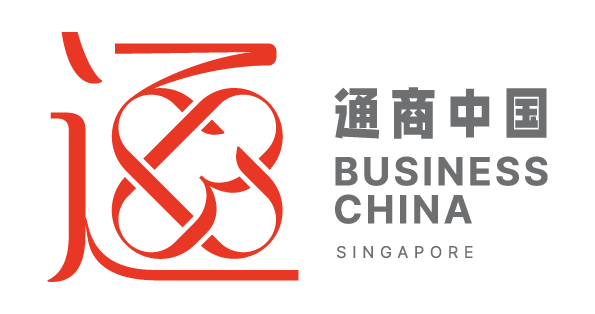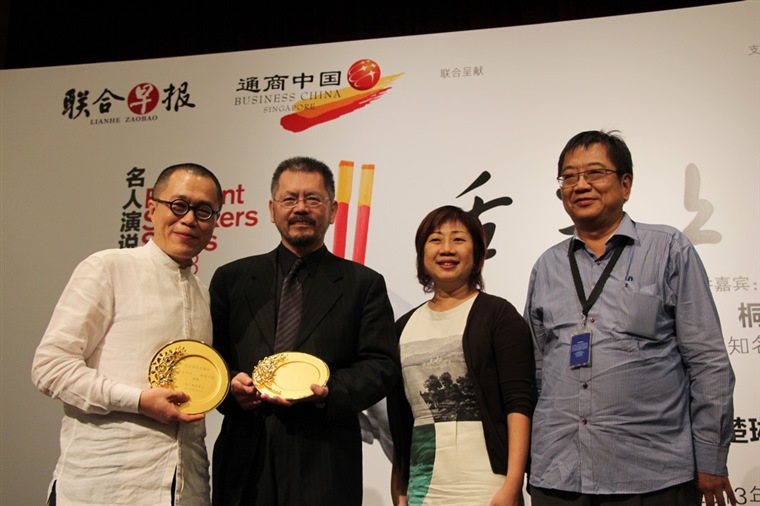“Food is a window to culture” – this is the first time the Eminent Speakers Series has invited two renowned culture connoisseur, Jiao Tong and Leung Man Tao to speak on the topic of food culture and explore the many facets of the Chinese community through food. Jointly organised by Business China and Lianhe Zaobao, the Eminent Speakers Series 2013: A Bite of Culture was held on 8th June 2013 at the SPH auditorium and attracted more than 450 participants.
Jiao Tung began the Forum with an introduction to Taiwanese cuisine. His presentation on the wide variety of Taiwanese food reflected the development and changes in its society as tracked by the development of the food culture; coupled with tantalising photos of some of the best local Taiwanese cuisine, his graphic presentation whetted the appetite of all participants. Jiao Tong was born in Kaohsiung City in 1956 and is currently an Associate Professor at the Department of Chinese Literature, National Central University. He has published numerous poetry and essay collections including “Poetry Jiao Tong: 1980-1993”, “Tasty Taiwan Trilogy: A Taste of Taiwan, A Flavor of Taiwan, A Treat of Taiwan”. Due to his unique background, he was able to integrate literature, politics and food culture in his works.
According to Jiao Tung, for one period in history, Taiwanese food was a reflection of nostalgia and a longing for one’s hometown on Mainland China. Any food that originated from Mainland China is enough to convey the taste of “home”, even though it may not be from one’s actual hometown. Taiwan now is confluence for food from all over the world, where one can find wide varieties, like Hokka Mee, Wenzhou dumplings, California beef noodle etc. The interesting phenomenon is that although these dishes were named after the places, they did not originate from there. This is similar to the case of Singapore’s Hainanese Chicken rice, which rose to fame in Singapore but unheard of on Hainan Island. Participants were able to better appreciate the complex socio-environmental factors of war, colonisation and immigration etc underpinning the development of food in Taiwan, after Jiao Tung’s engaging presentation. Despite Jiao Tung’s solemn expression during his presentation, his witticisms captivated the audience and drew bouts of laughter and cheer.
Next Leung Man Tao, speaking from a philosophical perspective, deliberated on the interconnectedness of food, language and value systems in the Chinese culture. Born in Hong Kong in 1970, Leung grew up in Taiwan but returned to Hong Kong in 1985 to continue his education. He subsequently graduated from the Chinese University of Hong Kong, Department of Philosophy. Leung is known for passionately supporting various social causes and movements, on top of being a famous culture critique. He is now a commentator with Phoenix TV, hosting “Eight Minutes of Reading” and “Behind the Headline with Wen Tao”.
To illustrate his point, Leung cited the example of “吃苦” (enduring hardship) which literally meant “eating bitterness”. Bitterness has traditionally been associated with poisonous food and therefore is a taste bud that served to warn and protect mankind. The Chinese, however, had not only overcome the undesirable taste, but further finessed it to gourmet status, creating delectable Chinese cuisine with bitter ingredients like the bitter gourd and other bitter Chinese herbs. The cultural symbol of “eating bitterness” and “enduring hardship” reflected the much revered characteristic of being resilient and its prominence in the Chinese culture.
The Q&A session commenced immediately after the keynote speeches by the two speakers. Chairperson of the session was Ms Lee Chor Lin, National History Museum’s first lady director in its 115 years of history. After a brief summary of each speaker’s speeches, the session was open to eager questions from the floor. Dr Li Bingxuan, a Business China member asked the speakers’ opinion on Singapore’s food fusion and whether it had instead become a confusion. He was also interested to know if we should use Chinese cutlery or Western cutlery with fusion cuisine? Jiao Tung replied that Singapore’s food fusion had been done well and in his opinion, there was no sign of confusion at all. He also felt that since most fusion food were developed from Chinese or Japanese cuisine, chopsticks would be more appropriate and comfortable. As for Leung, he shared that Singapore has had a long history for fusion food, citing the example of Nonya food. Nonya cuisine, in his opinion, exemplifies the adaptability and harmony of the Singapore society, starting a good tradition of well-integrated tastes and cultures.
Twenty-two year old student Guo Wang Lin, lamented Singapore losing its rich hawker heritage and asked the guest speakers for solutions. Leung replied frankly that it is a natural consequence of Singapore’s strive towards being a “middle-class” nation in the past 20 to 30 years. Many hawkers belittled their trade and discouraged their children from continuing in their footsteps, encouraging them to be professionals like doctors and lawyers instead. As such, the vanishing of Singapore’s hawker heritage would seem inevitable.
Launched in 2008, the Eminent Speakers Series invites prominent personalities who are highly regarded authorities in their respective fields to share their unique perspectives and insights on a broad range of topics, including current affairs, politics, business, economics, media, culture and the arts. The Series is jointly organised by Lianhe Zaobao and Business China, and supported by Singapore Press Holdings Foundation.

